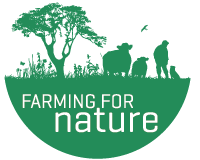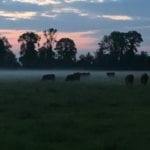Anthony Mooney
Anthony Mooney from county Kildare runs a 200-acre beef farm with the help of his wife Mary Rose and son Conor. The fertile limestone soil is well suited for growing high quality grass. Anthony runs a herd of between 70-100 cross-bred continental cattle. He keeps a suckler herd of 12 cows and the rest he buys in as weanlings to finish for beef.
The grassland has not been reseeded in over 25 years – the permanent pasture contains a diverse range of grasses and flowering plants. Anthony is passionate about biodiversity and nature conservation and this is reflected in his low-impact farming system. Very few external inputs are used on the farm - chemical fertilizer hasn’t been used on the land in over 20 years and very little concentrate meal is fed to the animals. Hay and silage are cut off the land every year for winter feeding. The multi-species hay meadows go to flower in the summer months, providing crucial habitats and food sources for various creatures.
A wildlife enthusiast for much of his life, Anthony has spent years observing and recording different plant, bird and insect species on the land. Rare plant species recorded on the farm include toothwort, sweet woodruff and wild orchids. “Over the past 2 years I have started targeting specific species on the farm that I thought needed help – birds, mammals, insects and plants. For example, we’ve been focusing on ground nesting birds like skylarks and meadow pipits - I delayed the mowing of a field last summer because there was a nesting skylark in one of the meadows.” There are 2 ponds on the land which create important water habitats for frogs, birds and insects. Trees and hedgerows are also important habitats on the farm – “I’ve put in around 600-700 meters of hedges on the farm. I’ve never taken out a hedge. I manage hedges for biodiversity. They are cut back every 4-5 years to encourage new growth.”
Nomination Description:
Anthony along with his wife Mary Rose and son Conor farm a 200 acre holding near Maynooth. The farm is a low lying farm in the Liffey drainage system and lends itself to grass production. He keeps 12 suckler cows and buys in approximately 120 cattle to finish to beef. For as long as he remembers Nature has always been cared for, observed and recorded on the farm. In the late 80s, he decided to clear the drainage ditches on the land and realized that the teals, ducks, eels and other wildlife had disappeared. He quickly put in some ponds to bring them back and it worked. In 99 he decided to plant 11 acres of broadleaf trees and now has woodcock, more birds in general and more birds of prey. He also stopped the tillage operation and moved from silage to hay. This slowed down the whole farm operation, allowing the fields to flower and become meadows. This increased greatly the amount of wildlife and insects they support. Last summer he spotted a Skylark nesting in one of the meadows and delayed harvest until the chicks had fledged. He also had Meadow Pipits nesting. He planted hedges for REPS integrating a lot of different species. In the last 5 years he noticed a decline in the number of hares on his farm. This could have been due to a new motorway blocking their access and wire fencing on adjoining properties. With the help of Birdwatch Ireland and Kildare Wildlife Rescue, he has now successfully released rescue leverets on his farm and was delighted to see 4 adult hares together this winter. He is also a member of the “Protecting Farmland Pollinators” EIP and greatly enjoys constantly learning more about Nature and how to farm alongside it.
Nominator: Mirielle McCall, FFN Ambassador




